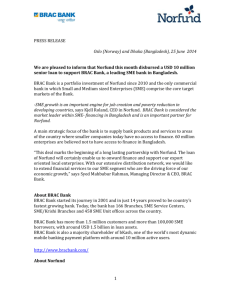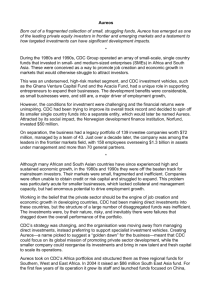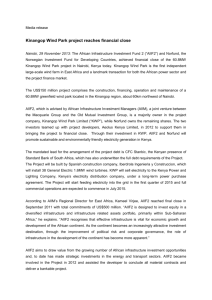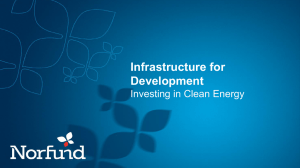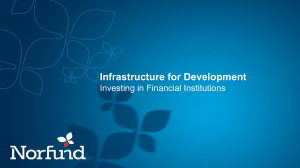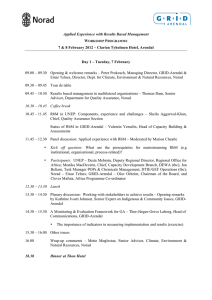III. Norwegian Investment Fund for Developing Countries (NORFUND)
advertisement
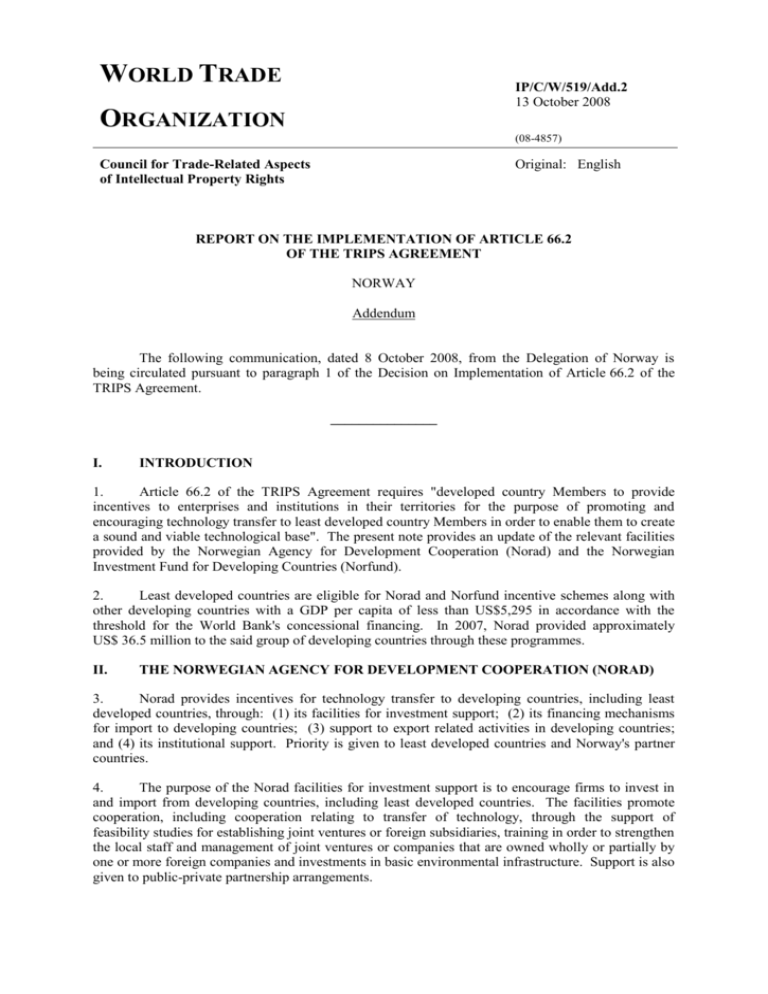
WORLD TRADE IP/C/W/519/Add.2 13 October 2008 ORGANIZATION (08-4857) Original: English Council for Trade-Related Aspects of Intellectual Property Rights REPORT ON THE IMPLEMENTATION OF ARTICLE 66.2 OF THE TRIPS AGREEMENT NORWAY Addendum The following communication, dated 8 October 2008, from the Delegation of Norway is being circulated pursuant to paragraph 1 of the Decision on Implementation of Article 66.2 of the TRIPS Agreement. _______________ I. INTRODUCTION 1. Article 66.2 of the TRIPS Agreement requires "developed country Members to provide incentives to enterprises and institutions in their territories for the purpose of promoting and encouraging technology transfer to least developed country Members in order to enable them to create a sound and viable technological base". The present note provides an update of the relevant facilities provided by the Norwegian Agency for Development Cooperation (Norad) and the Norwegian Investment Fund for Developing Countries (Norfund). 2. Least developed countries are eligible for Norad and Norfund incentive schemes along with other developing countries with a GDP per capita of less than US$5,295 in accordance with the threshold for the World Bank's concessional financing. In 2007, Norad provided approximately US$ 36.5 million to the said group of developing countries through these programmes. II. THE NORWEGIAN AGENCY FOR DEVELOPMENT COOPERATION (NORAD) 3. Norad provides incentives for technology transfer to developing countries, including least developed countries, through: (1) its facilities for investment support; (2) its financing mechanisms for import to developing countries; (3) support to export related activities in developing countries; and (4) its institutional support. Priority is given to least developed countries and Norway's partner countries. 4. The purpose of the Norad facilities for investment support is to encourage firms to invest in and import from developing countries, including least developed countries. The facilities promote cooperation, including cooperation relating to transfer of technology, through the support of feasibility studies for establishing joint ventures or foreign subsidiaries, training in order to strengthen the local staff and management of joint ventures or companies that are owned wholly or partially by one or more foreign companies and investments in basic environmental infrastructure. Support is also given to public-private partnership arrangements. IP/C/W/519/Add.2 Page 2 5. The purpose of the financing arrangements for export (i.e. import to developing countries) of capital goods, technology and services is to promote transfer of technology more directly. They include support for training in connection with export, untied mixed credits (concessional credits), export credit guarantees (through the Norwegian Institute for Export Guarantees). Special training arrangements in connection with such export to developing countries are often necessary to ensure an effective transfer of technology and the proper operation and maintenance of machines and equipment. 6. The purpose of supporting export related projects is to strengthen the countries' export potential and to facilitate trade by assisting in building institutional and national capacities i.e. relating to standards, metrology, testing and quality and trade facilitation. Norad has, and is supporting several regional and national programmes leading to international recognition and acceptance of certification systems, both on multi-bi basis as well as bilaterally. Some of these programmes also include financing of testing laboratories both for food export and particular industrial goods. Assistance is also given to exporters in developing countries and to the development of quality and design of products (product development) in order to meet international market requirements. The area of trade facilitation is important for the development of trade, not least regional trade and support is given mainly through multilateral and international organizations. III. NORWEGIAN (NORFUND) INVESTMENT FUND FOR DEVELOPING COUNTRIES 7. The purpose of Norfund is to promote private-sector development in developing countries by providing risk capital and expertise. Norfund supports the realization of viable commercial projects, which balance economic, social and environmental considerations, by investing in private enterprises. Norfund's strategy is to invest primarily in four geographical areas, namely Southern Africa, Eastern Africa, Central America and the Mekong area in which there is a high concentration of least developed countries and Norfund has a local presence with offices and staff (except Mekong which is the only region in which Norfund does not have an office for the time being). 8. Norfund is both providing loans and taking equity and invests both directly in companies and through local funds. Investments in investment funds provide a capital base to a local fund manager which in turn invests in several local SME companies. Energy provision and the financial sector are two sectors in which Norfund is heavily invested. Energy is a perquisite for development and growth and investments in and loans to banks and financial institutions help create more sustainable local capital markets that give small and medium-sized enterprises better access to financing. Norfund is also a financing partner for business in a range of other sectors both through direct investments and local investment funds. In addition to investing capital in various investment funds, Norfund has worked extensively with developing Aureos, a fund management company serving the SME-segment in developing countries. Norfund has also established a joint venture with Statkraft, Norway's largest producer of electric power, investing in the energy sector in developing countries. This joint venture, called Statkraft Norfund Power Invest (SN Power), contributes to the transfer of hydropower technology and management capabilities to emerging markets through several hydropower investments, such as for instance the Khimti Hydroelectric Project in Nepal. 9. Norfund's direct investments are made jointly with private companies, mostly in cooperation with local partners in developing countries. In addition to providing risk capital, Norfund is actively contributing to the success of investee companies, by exercising long-term ownership and providing access to regional and industrial expertise. To invest, Norfund requires projects to be promoted by reputable business partners, that a credible and profitable business case for the investment can be presented, that no irreversible environmental or social consequences will follow from the project and that a willingness to work with Norfund to achieve continous improvement of operations is in place. IP/C/W/519/Add.2 Page 3 Norfund normally injects less capital than the amount invested by the promoter, and Norfund's involvement is always through investments, not subsidies. 10. For further details concerning the above-mentioned incentive schemes, please contact: Norwegian Agency for Development Co-operation (Norad) Department for Private Sector Development P.O. Box 8034 Dep., N-0030 Oslo, Norway Tel: +47 22 24 20 30 Fax: +47 22 24 20 31 Email: postmottak@norad.no Website: www.norad.no Norwegian Investment Fund for Developing Countries (Norfund) P.O. Box 1280 Vika, N-0111 Oslo, Norway Tel: +47 22 01 93 93 Fax: +47 22 01 93 94 Email: post@norfund.no Website: www.norfund.no __________
